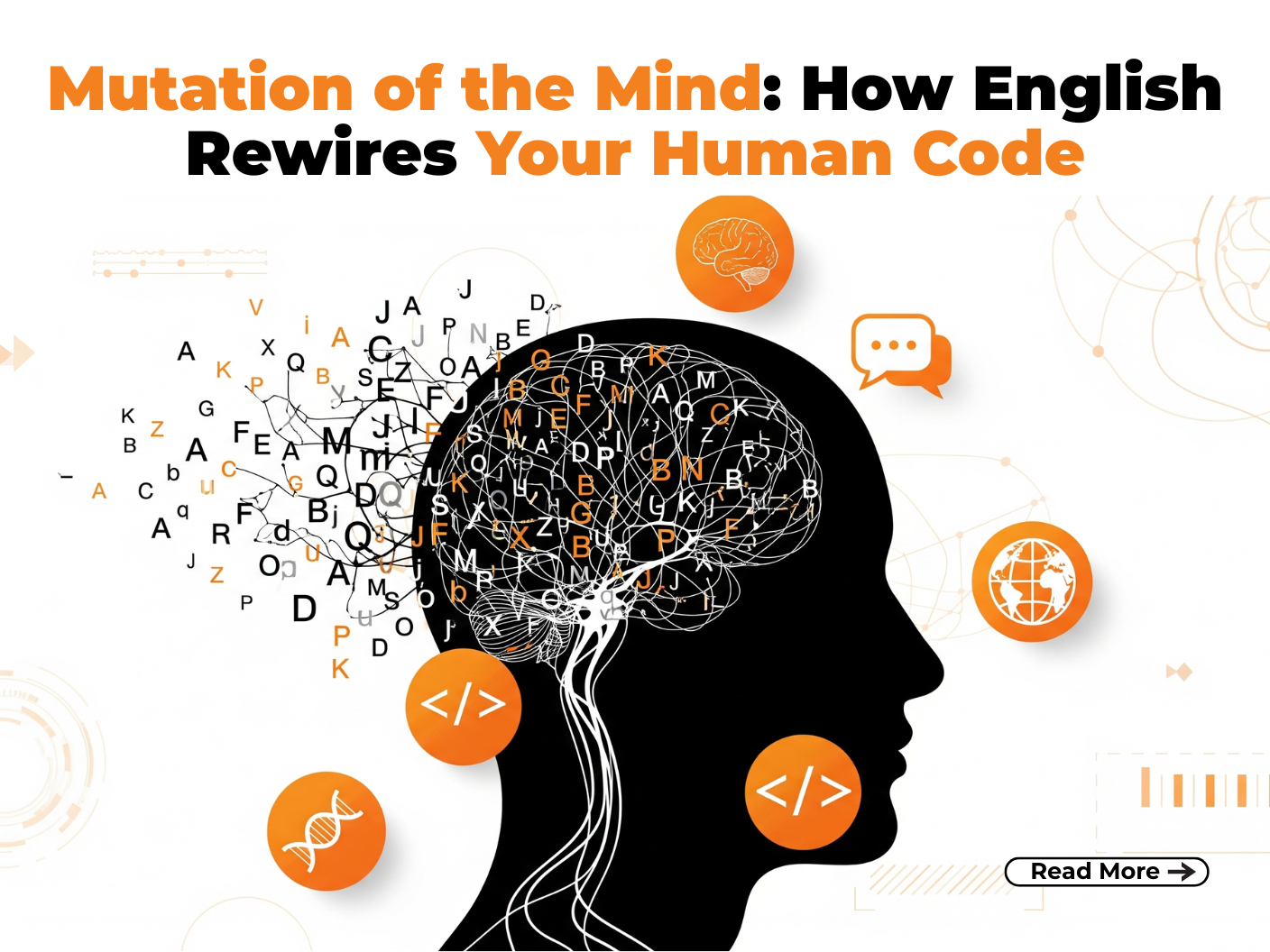Your brain isn’t just learning a language—it’s mutating into a higher version of itself.
“The limits of your language are not just the limits of your world—they are the limits of your evolution.”— Adapted from Ludwig Wittgenstein
What if learning English was not just a skill—but a silent revolution inside your brain? Every sentence you shape, every pause to find the right word, doesn’t just improve your speech—it subtly rewires how you feel, think, and connect.
This isn’t a metaphor. Neuroscience confirms that acquiring a second language—especially one as globally layered and emotionally elastic as English—reshapes brain pathways linked to memory, attention, and emotional balance.
This highlights the deep relationship between language learning and cognition.
But the real mutation begins where science stops: in your mindset. You don’t just become more fluent—you become more flexible. You don’t just gain words—you gain new ways of seeing the world.
You begin to listen not just for meaning, but for tone. You begin to pause before reacting. You start noticing the difference between hearing and understanding—and in that pause, you grow. Studies have shown strong bilingual brain effects in such reflective language processing. English, with all its contradictions and cultural fingerprints, doesn’t offer clarity—it demands it. It invites confusion and then rewards curiosity.
What starts as grammar practice often ends in self-discovery. One day, you’re learning to frame a question. The next, you’re questioning your own assumptions.
This is a perfect example of how English changes thought patterns.
In a time when students often speak faster than they think and type before they feel, English can be more than language.
In this blog, we’ll explore how English isn’t just a language you learn—it’s a code you evolve.
The Linguistic Mutation Begins in the Brain
When you begin learning English, your brain doesn’t simply store new words—it reorganizes itself. This is due to language and neuroplasticity, which enables brain remodeling through learning. According to neuroplasticity research, acquiring a second language enhances the density of grey matter in the inferior parietal cortex, the region responsible for abstract reasoning and cognitive flexibility. This isn’t just memory work—it’s neurological architecture being rebuilt.
English, in particular, is a peculiar linguistic code: paradoxically precise and ambiguous, rich in idioms, yet efficient in corporate clarity. Mastering it requires the speaker to juggle emotion, tone, structure, and cultural context—often simultaneously. This multitasking activates and strengthens neural networks that monolinguals rarely access.
The impact of English on thinking is visible in how learners adapt across multiple domains simultaneously.
Take, for instance, the way many Indian students translate directly from Hindi to English—”My nose is flowing,” or “He is standing on my head.” While amusing, these literal translations often spark laughter that turns into learning. The brain adjusts. Students begin to say, “I have a cold” or “He’s bothering me too much.” This correction is not just linguistic; it is cognitive refinement in real-time.
The result? A mind that no longer thinks in straight lines but in layers. A speaker who can not only describe what they see, but what they imply, suggest, or subtly challenge. Learning to say “I see your point, but may I offer another perspective?” is not just a phrase—it’s a mental mutation from fight-or-flight to fluid diplomacy.
In effect, English doesn’t merely give you vocabulary—it gives you more selves. Each new register you acquire (formal, academic, humorous, persuasive) becomes an added dimension of thought.
Cultural DNA: How English Gives You a New Identity
Language is not just a medium of communication—it is a vessel of culture, worldview, and social rhythm. When you learn English, you inherit more than just grammar rules; you inherit an entire cultural operating system. This transformation aligns with broader theories in language learning and cognition. You begin to think in metaphors shaped by history you didn’t live, a joke in humour that’s culturally coded, and navigate politeness formulas that are entirely unlike your own. This is not mimicry—it is evolution through absorption.
English, as a global lingua franca, acts like cultural recombinant DNA. It fuses diverse accents, idioms, and registers from across the globe, allowing speakers to inherit traits that suit their context selectively. A Korean student quoting Shakespeare in a UN speech, an Indian entrepreneur pitching in Californian tech-speak, a Brazilian artist weaving irony in fluent British English—these are not imitations but new species of expression.
I once observed a student from a rural background—quiet, brilliant, but hesitant—deliver a presentation entirely in English.
He opened with a soft joke, transitioned into crisp arguments, and concluded with the phrase, “To sum it up without sounding dramatic, this data could change lives.” The audience applauded—not just the content, but the confidence. English had not only given him a voice; it had rewired how he believed in himself.
This transformation is subtle yet profound. English, then, becomes more than a language; it becomes a mirror in which the speaker sees a more nuanced, cosmopolitan version of the self.
He began with a soft joke comparing Bollywood drama to Shakespeare, presented forth his argument fluently, and wrapped up with the line, “To sum it up without sounding dramatic, this data could change lives.” The room broke into applause – his newfound confidence caught everyone pleasantly off guard.
When Grammar Becomes Genetics
At some point, every English learner has felt like they’re being genetically tested by grammar. Past perfect? Future continuous? Conditional type 3? It’s less a sentence structure and more a mental obstacle course with invisible checkpoints. This ongoing challenge also strengthens bilingual brain effects, especially in problem-solving. But here’s the twist: every time you wrestle with a line like “If I had been invited, I would have gone,” your brain isn’t failing—it’s mutating. It’s bending time, processing parallel outcomes, and upgrading its internal logic systems in ways our cave-dwelling ancestors couldn’t fathom. Think of it: English lets you rewind reality (“I should have studied”), edit emotions (“I could have loved her”), or hedge existence entirely (“If I were you…”). One student once said, “Sir, learning English feels like playing chess inside my head—but all the pawns are feelings.” And he was right. Grammar may look cold on the page, but it’s emotional engineering—a blueprint for alternate lives. The irony? The more confused you are, the closer you are to transformation. Because only those who get lost between clauses discover entirely new ways of thinking, speaking, and—perhaps—being.
Conclusion: Evolve Every Time You Speak
Every time you speak in English—hesitant or fluent, rehearsed or spontaneous—you are doing something extraordinary: you’re evolving in real-time. This is at the heart of how English changes thought patterns. You are not just learning a second language; you’re developing a second mind. The leap from silence to speech, from translation to thought, is not academic—it is deeply human.
What begins as vocabulary soon becomes a vision. As we grasp new words, we begin to see new worlds—possibilities, nuances, and versions of ourselves that we never knew existed. In its evolving global form, English is no longer just a tool for career or convenience—it is a mirror of our mental growth and a map to our future identity.
To speak is to shape—to alter your neurons, your perceptions, your place in the world. Language and neuroplasticity allow this shift to become a lasting change. English gives voice not only to information but also to emotion, imagination, and innovation. Today’s learner is the leader of tomorrow—not because of perfect grammar, but because they dared to express with courage.
And perhaps the most profound truth is this: the human mind doesn’t wait for biology to evolve—it mutates through language. The moment you choose to speak clearly, listen deeply, and connect honestly, you have already stepped into your next version.
So, learn English. Not just to impress or express—but to become.














